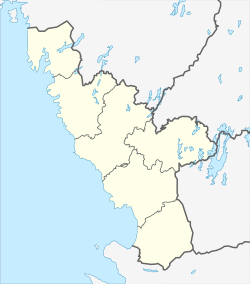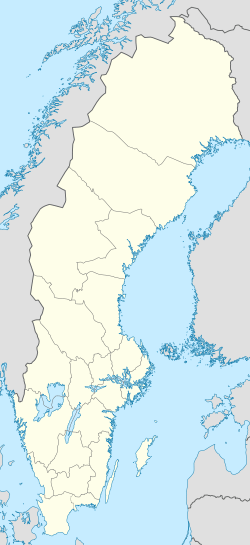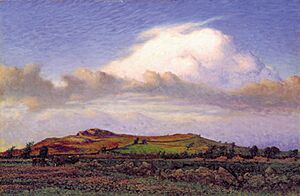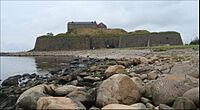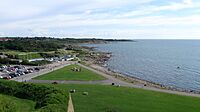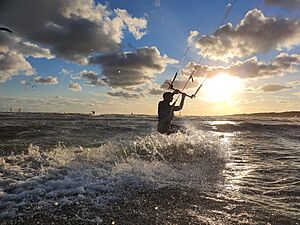Varberg facts for kids
Quick facts for kids
Varberg
|
||
|---|---|---|
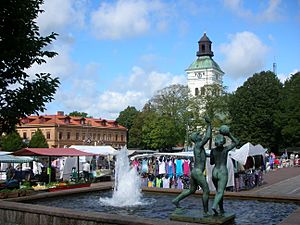
The marketplace and Varberg Church
|
||
|
||
| Country | Sweden | |
| Province | Halland | |
| County | Halland County | |
| Municipality | Varberg Municipality | |
| Area | ||
| • Total | 24.61 km2 (9.50 sq mi) | |
| Population | ||
| • Total | 35,782 | |
| • Density | 1,454/km2 (3,770/sq mi) | |
| Time zone | UTC+1 (CET) | |
| • Summer (DST) | UTC+2 (CEST) | |
| Website | varberg.se | |
Varberg is a town in Halland County, Sweden. It is the main town of Varberg Municipality. In 2019, about 35,782 people lived there.
Varberg and the whole Halland region are famous for their sandy beaches. The coast in Varberg changes from wide sandy areas to rocky parts. These rocky areas continue north towards the North Cape. Many people think Varberg is one of Sweden's most beautiful cities.
Contents
Explore Varberg's Location and Nature
Varberg is on Sweden's west coast. It is a popular place for beach trips and surfing. A big landmark is the Varberg Fortress and Castle. For many years, Denmark and Sweden fought wars here. Varberg became part of Sweden for good in 1658. This happened because of the Treaty of Roskilde.
Varberg is a small town. Many of its buildings are from the early 1900s. It has lovely green parks like the Society Park and the English Park. But it was not always like this! In the 1800s, the town had few trees. It was mostly bare rocks and sand. A famous Swedish writer, Esaias Tegnér, even called it the least appealing place in Sweden in 1826. Today, things are very different. Its sandy beaches are a favorite spot. The areas further inland have rolling hills, lakes, and forests. This is a nice change from the flat coast.
Varberg's Weather
Varberg has an oceanic climate. This means its weather is milder than many other places in Sweden. However, it still has clear changes between seasons. Summers are usually cooler than in Halmstad and Gothenburg. This is because of the cool air from the sea. But some summer days can be very hot. Some winter nights can also be very cold.
The hottest temperature ever recorded since 1901 was 33.6°C (92.5°F). This happened on July 31, 2018. The coldest temperature was -25.5°C (-13.9°F) in January 1942.
| Climate data for Varberg (temperatures 2002–2020 averages; extremes 1901–present) | |||||||||||||
|---|---|---|---|---|---|---|---|---|---|---|---|---|---|
| Month | Jan | Feb | Mar | Apr | May | Jun | Jul | Aug | Sep | Oct | Nov | Dec | Year |
| Record high °C (°F) | 9.4 (48.9) |
10.8 (51.4) |
19.2 (66.6) |
27.6 (81.7) |
30.5 (86.9) |
31.9 (89.4) |
33.6 (92.5) |
33.1 (91.6) |
28.2 (82.8) |
21.6 (70.9) |
14.4 (57.9) |
10.4 (50.7) |
33.6 (92.5) |
| Mean maximum °C (°F) | 6.5 (43.7) |
7.0 (44.6) |
12.4 (54.3) |
19.1 (66.4) |
26.0 (78.8) |
26.8 (80.2) |
28.8 (83.8) |
28.5 (83.3) |
23.6 (74.5) |
17.1 (62.8) |
12.4 (54.3) |
7.9 (46.2) |
30.2 (86.4) |
| Mean daily maximum °C (°F) | 2.2 (36.0) |
2.7 (36.9) |
5.9 (42.6) |
12.0 (53.6) |
16.8 (62.2) |
19.9 (67.8) |
22.0 (71.6) |
21.5 (70.7) |
17.8 (64.0) |
11.9 (53.4) |
7.2 (45.0) |
4.2 (39.6) |
12.0 (53.6) |
| Daily mean °C (°F) | 0.1 (32.2) |
0.3 (32.5) |
2.6 (36.7) |
7.5 (45.5) |
11.7 (53.1) |
15.6 (60.1) |
17.9 (64.2) |
17.6 (63.7) |
14.2 (57.6) |
8.8 (47.8) |
5.1 (41.2) |
2.1 (35.8) |
8.6 (47.5) |
| Mean daily minimum °C (°F) | −2.1 (28.2) |
−2.1 (28.2) |
−0.8 (30.6) |
3.0 (37.4) |
7.6 (45.7) |
11.3 (52.3) |
13.8 (56.8) |
13.6 (56.5) |
10.6 (51.1) |
5.6 (42.1) |
2.9 (37.2) |
0.0 (32.0) |
5.3 (41.5) |
| Mean minimum °C (°F) | −11.9 (10.6) |
−10.7 (12.7) |
−8.5 (16.7) |
−4.2 (24.4) |
0.1 (32.2) |
5.6 (42.1) |
8.9 (48.0) |
7.6 (45.7) |
2.2 (36.0) |
−2.8 (27.0) |
−6.6 (20.1) |
−8.6 (16.5) |
−13.9 (7.0) |
| Record low °C (°F) | −25.5 (−13.9) |
−22.0 (−7.6) |
−22.1 (−7.8) |
−9.5 (14.9) |
−5.1 (22.8) |
1.4 (34.5) |
4.7 (40.5) |
3.3 (37.9) |
−2.4 (27.7) |
−9.7 (14.5) |
−12.6 (9.3) |
−20.8 (−5.4) |
−25.5 (−13.9) |
| Average precipitation mm (inches) | 76.2 (3.00) |
54.0 (2.13) |
47.5 (1.87) |
36.5 (1.44) |
46.4 (1.83) |
76.3 (3.00) |
84.5 (3.33) |
105.8 (4.17) |
74.5 (2.93) |
96.1 (3.78) |
80.3 (3.16) |
78.7 (3.10) |
856.8 (33.74) |
| Source 1: SMHI Open Data | |||||||||||||
| Source 2: SMHI Average Data 2002-2020 | |||||||||||||
Varberg's Past
A fortress named Varberg was built in the 1280s. Its name, Wardbergh, meant "watch hill." It was part of a line of military bases along the coast. At that time, this area belonged to Denmark. In the mid-1300s, an older town called "Getakärr" took the fortress's name. This town was about 1 kilometer north of the fortress.
Around the year 1400, the town moved about 5 kilometers north. It was destroyed during the Kalmar War (1611-1612). After that, it was rebuilt closer to the fortress. In 1645, Halland, including Varberg, became part of Sweden from Denmark. This was for 30 years, agreed in the Treaty of Brömsebro. Varberg had about 600 people then. The change became permanent in 1658 with the Treaty of Roskilde.
The town moved again after a big fire in 1666. It moved to where the city center is today. Another huge fire in 1863 destroyed much of the city. It was then rebuilt with houses made of stone or brick. By 1890, over 4,000 people lived there. With new industries, the population grew to 8,500 by 1930. In 1971, a local government change made Varberg the main town of a much larger area. This area, Varberg Municipality, now has almost 56,000 people. Even though some old houses were taken down in the 1970s, most of the city center is still original.
Places to See in Varberg
Varberg Fortress is the most famous old building in the city. It is very large. It was first built as a castle in 1280. New parts were added over many years.
Near Varberg, you can find the VLF transmitter Grimeton. This is a cool radio station. UNESCO has named it a World Cultural Heritage site. You can visit it during the summer. Bexell Cottage is also in the area.
Komedianten is a modern center for culture and performances. It was built between 2010 and 2012.
Sports in Varberg
Here are some sports clubs in Varberg:
- Varbergs BoIS FC
- Varbergs GIF FK
- Lilla Träslövs FF
- Varberg Vipers
Many places in and around Varberg are great for water sports. Apelviken (Apple Bay Beach) is south of Varberg. It has many places to rent gear and facilities for sports like windsurfing, standup paddleboarding, and kitesurfing.
Getting Around Varberg
Varberg Airport (ICAO code ESGV) is located northwest of the town.
Varberg's European Connections
- Varberg is a member city of the Eurotowns network. This group helps European towns work together.
Famous People from Varberg
- Ingemund Bengtsson, a politician who was the Speaker of the Swedish Parliament.
- Niclas Eliasson, a football player.
- Sophie Gustafson, a golfer.
- Kamchatka, a hard rock band.
- Andy LaRocque, a guitarist, songwriter, and producer.
- Dick Lövgren, a bass guitarist for the band Meshuggah.
- Sven Nylander, a 400m hurdler.
- Gösta Pettersson, a biochemist.
- Mathilda Ranch, an early photographer from Varberg.
- Stefan Selaković, a football player.
- Margareta Svensson, a singer and TV personality.
- Otto Torell, a naturalist and geologist.
- Dafina Zeqiri, a singer.
See also
 In Spanish: Varberg para niños
In Spanish: Varberg para niños
 | Valerie Thomas |
 | Frederick McKinley Jones |
 | George Edward Alcorn Jr. |
 | Thomas Mensah |



